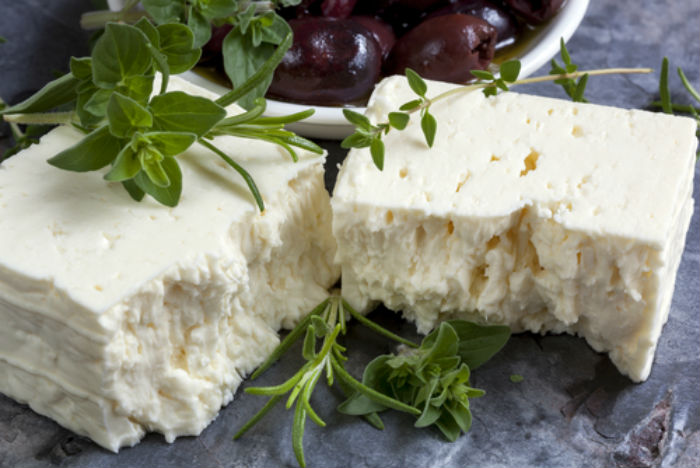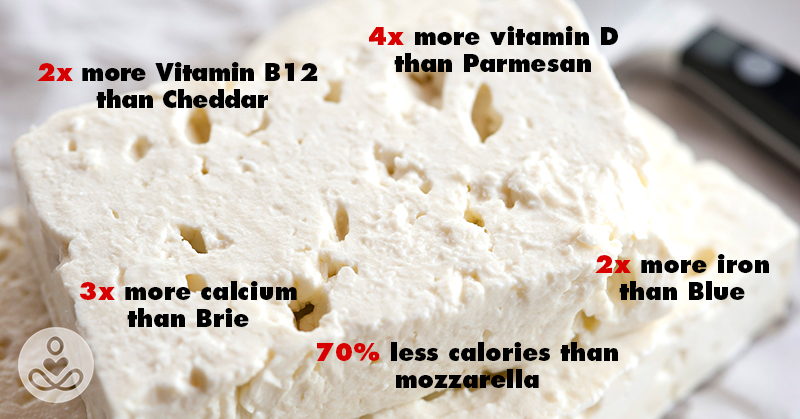Feta cheese is one of the most unique cheeses you can find. Its mildly nutty in flavor, has a soft but firm texture, and adds the perfect slightly salty, cheesy punch to an otherwise boring dish. If you’ve ever had Greek, Mediterranean, or Middle Eastern food, then you know how much feta can elevate a dish.
What you may not know, however, is that feta cheese can be as good for you as it is delicious. In fact, its unique nutritional profile may make it worthy of the title “Healthiest Cheese in the World”. Keep reading to learn all the feta cheese health benefits you could be missing out on!
Feta Cheese Nutrition

Cheese? Healthy? Really?! While it’s no broccoli, feta has some undeniable nutritional gold-stars, especially if it’s made from organic sheep’s or goat’s milk. Let’s begin by comparing the good and bad of this unique cheese product:
The Good Feta Cheese Health Benefits
Good source of: (1)
- Protein (14g per cup)
- Riboflavin (1.3mg per cup, 74% DV)
- Vitamin B12 (2.5mcg per cup, 42% DV)
- Calcium (739mg per cup, 74% DV)
- Phosphorous (506mg per cup, 51% DV)
The Bad
High in: (1)
- Cholesterol (133mg per cup, 44% DV)
- Sodium (1674mg per cup, 70% DV)
Beyond just pure nutritional content, however, feta cheese has some unique properties about it that make it worthy of being called the healthiest cheese. These five surprising health benefits of feta will perhaps give you the green light when deciding whether or not to add feta cheese to your salad at lunch today.
5 Surprising Health Benefits of Feta Cheese

1. Suitable for people who can’t digest cow dairy
Whether they know it or not, the majority of the population has varying degrees of difficulty digesting cow’s milk products. Feta cheese health benefits are not included in that! Thanks to feta, you don’t have to give up cheese all together! Good quality feta cheese is made primarily from sheep’s milk and sometimes goat’s milk, which is much easier on our stomachs. In fact, you should really never buy feta that’s made from cow’s milk: It’s not the real thing, and the flavor profile is completely different. (2)
2. Histidine and Vitamin B6 Combination

Histidine is an essential amino acid (especially for children), meaning our bodies don’t produce it and we have to get it through our diets. (3, 5) Vitamin B6 is crucial for converting food into energy, metabolizing fats and proteins, and is a key nutrient for the health of our eyes, hair, skin, and liver. (4)
When You combine histidine with vitamin B6, they create histamines, which are part of the inflammatory response by your body’s cells in response to injury and illness. Often inflammation and histamine reactions are spoken of negatively, in terms of chronic illness and allergic reactions. In reality, however, small amounts of acute inflammation are required to fight off sickness and help your body heal. This makes feta cheese beneficial for your immune system, especially when eaten alongside antioxidant-rich foods like fruits and vegetables. (5, 6)
Studies also show that foods with both histidine and vitamin B6 are useful for treating, improving, and recovering from problems with fatigue. (7)
3. High Protein Content
Every cell in your body contains protein. We need protein to repair cells and make new ones, and for proper immune function. They function as enzymes, antibodies, messengers, structure and support, transport, and storage. In short, we wouldn’t exist without protein! (8)
Type 2 Diabetes
One of the best feta cheese health benefits is its high protein content (sitting at 4 grams of protein per 28-gram serving!) What’s better, is this study that shows how effective protein, especially from animal milk products such as cheese, is at lowering your risk of Type 2 Diabetes. Researchers found that the protein in these products has a positive effect on insulin secretions and that the combination of calcium, magnesium, potassium, specific fatty acids, and low glycemic index sugars have beneficial effects on glucose control, insulin sensitivity, and insulin secretion. This, in turn, lowers your risk of developing Type 2 Diabetes.(9)
4. Calcium and Bone Health
It’s no surprise that feta cheese is a good source of calcium, the mineral that plays an undeniable role in the health of your bones. Calcium also helps your blood clot properly, your nerves send messages, and your muscles contract. (10, 11)
99% of your body’s calcium stores are found in your bones and teeth, and every day, you lose calcium through your skin, hair, nails, sweat, urine, and feces. Unfortunately, your body cannot produce new calcium to replace it, so either you get it from your diet, or your body steals calcium from your bones, leading to fractures, breaks, and osteoporosis. (10, 11)
Other important minerals for bone health are vitamin D and Magnesium, without them calcium can’t do its job. Read here for more information on vitamin D, and here for more information on Magnesium.
5. Vitamin A
Vitamin A is a fat-soluble vitamin crucial for immune function, vision, reproduction, and communication between your cells. (12) Feta is an excellent source of vitamin A, and the fat content in the cheese makes it more readily absorbed by your body.
With All These Feta Cheese Health Benefits, Moderation is Still Key

As mentioned earlier, despite all of its nutritional positives, feta is still cheese, and a salty one at that, so a little goes a long way. Keep it to a sprinkling add pizzazz to a salad, pita, bruschetta bread, or try some along with fresh fruit or a drizzle of honey.
Tips on How to Buy Good Quality Feta Cheese
- Look for cheese made from sheep or goat’s milk (or a combination of both).
- Buy certified organic.
- Watch out for yellowing. Feta should always be white and is stored in brine to keep it that way. Yellowing means at some point it has been exposed to air outside the brine.
- Buy Greek, if you can. Regulations for feta cheese in Greece are rigorous (they have their priorities straight!) so you know that by purchasing Greek feta cheese, you are getting authentically sourced and produced feta cheese.
- It should have tiny holes on the surface, and shouldn’t crumble too easily. Super crumbly feta means that it was probably made using cows milk (aka fake feta). (13)
Feta cheese health benefits are plenty and, when used in moderation, can help improve your health. Even just a small amount can make even somewhat boring foods taste incredible, so go ahead – indulge in a little feta cheese. Your body (and your taste buds!) will thank you.

Sources
- (1) https://nutritiondata.self.com/facts/dairy-and-egg-products/18/2
- (3) https://pubchem.ncbi.nlm.nih.gov/compound/L-histidine#section=Top
- (5) https://www.ncbi.nlm.nih.gov/pmc/articles/PMC301830/
- (7) https://www.google.com/patents/US20160287616
- (8) https://medlineplus.gov/genetics/understanding/howgeneswork/protein/
- (10) https://www.nof.org/patients/treatment/calciumvitamin-d/
- (11) https://www.cambridge.org/core/services/aop-cambridge-core/content/view/S0029665103001125
- (12) https://ods.od.nih.gov/factsheets/VitaminA-HealthProfessional/

